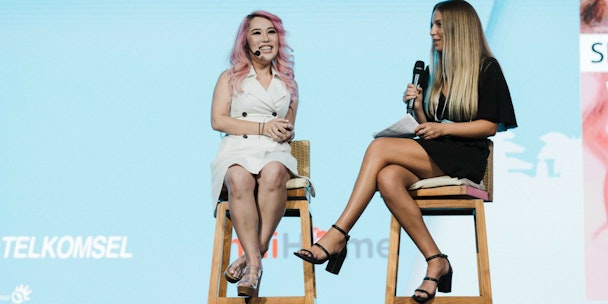Xiaxue on fake followers, brand safety and imposing regulations on influencers
The entire influencer marketing industry needs to be regulated and issues like fake followers addressed, says well-known influencer Xiaxue.

Wendy Cheng (Xiaxue) (left), on stage at Engage Bali 2018. Photo: Socialbakers.
Wendy Cheng, who is one of the earliest social influencers in Singapore, says that as the trend of influencers and brands not disclosing paid partnerships is getting worse, it strengthens the need to regulate and clamp down on these practices.
Cheng is also popularly known as Xiaxue and started blogging in 2005. She spoke to The Drum at Socialbaker’s Engage Bali 2018 before going on stage as one of the invited panelists.
Reflecting on her more than a decade-long experience on the scene, Cheng says that brands have become more digitally mature over the years, but there is still room for improvement. “Brands are a lot more confident now because in the past, when I first started in 2005, they did not know what blogging was, because the people in charge of the budget were not digitally-advanced.”
“To them, advertising was sending emails and buying banner ads. None of them had ever heard of bloggers doing editorials or sponsored reviews. So, they did not have confidence in doing it, because it was something completely new to them,” she adds.
Cheng also notes that brands used to be afraid that engaging influencers would make their brand look less premium, but today, almost every brand is working with influencers and the size of the brands have become bigger. “In the past, it used to be startups or smaller brands, but a lot of big brands have come in, like Sony, who I work with,” she explains.
However, as more partnerships start to form between brands and influencers, Cheng observes that sponsored posts or products on social media are not disclosed as such. She cites a wedding that made headlines in Singapore in 2017 after the couple failed to disclose that many of the products given to guests were sponsored.
“After the wedding happened, the Advertising Standards Authority of Singapore talked to us about it and set a guideline where influencers must disclose an ad,” she says. “However, it is just a guideline. At the end of the day, there are no consequences if people don't choose to abide by it. With the influx of new influencers, they do not care because they want fame and money.”
“They (the influencers) do not think about how this can be a long-term career and about how reputable the brands are. I really hope that something can be done about this,” she adds.
Cheng then weighs in on a campaign that saw Singapore’s Ministry of Finance using nano influencers for Budget 2018. The Ministry engaged an agency called StarNgage, which provided influencers with a wide-ranging number of followers.
“For MOF, the budget was very small, which explains the influencers they hired. I don't think it was very effective, but in a way, it was effective in a sense that it went viral because some of the influencers were so terrible that they called the Ministry of Finance, the 'government of finance’,” she explains. “In a way, it was bang for the buck for MOF, because of how bad the influencers were. The government was probably not experienced enough when it comes to hiring influencers, which was probably why they used an agency.”
The 33-year-old also blamed the agency for being ‘dishonest’, because the influencers they picked for MOF were ‘not really influential’. “I hope that brands can educate themselves in this sphere before they decide to do influencer marketing, because there are dishonest people everywhere. If you do not know the sphere very well, ask your niece or nephew who do they read or follow. If I want to talk about finance, who should I approach, and which websites are more credible?” says Cheng.
As someone who is not shy of courting controversy – she has made a make-up tutorial for ISIS on YouTube and called out Singtel for a smear campaign against rivals Starhub and M1 – Cheng keeps true to form when she went up to stage for her panel after her interview with The Drum, expressing some controversial thoughts on brand safety.
Defending YouTube personality Logan Paul after a member of the audience asked if brands should stay away from controversial influencers, Cheng said: “I feel that advertisers were too nitpicky about this, if I see a Coca-Cola ad before a Logan Paul suicide forest video, I’m not going to think that Coca-Cola endorses suicide.”
“I don’t think that’s negative for the brand because if you are an advertiser on YouTube you never know whose video your ads are going to appear and that is the risk you have to take.”
In fact, Cheng believes controversial videos like animal cruelty can help raise brand awareness. “At the end of the day if the influencer does something really shameful, for example, if someone is advertising with me and tomorrow I am killing kittens, the brand would come out and say, 'it was a mistake to advertise with her and we don't associate with killing kittens'.
“Not only do they avoid the killing kittens issue, but they also get publicity for that. All the news outlets would be covering this influencer being dropped by this brand. So, I don’t think it is bad news for the brand. It is almost like a different kind of marketing,” she adds.
If brand safety does not concern Cheng, what is she concerned about then? Fake followers, she tells this reporter. “We need to get rid of fake followers problem because a lot of people buy them and it is virtually impossible to detect because the bots are so sophisticated now.”

